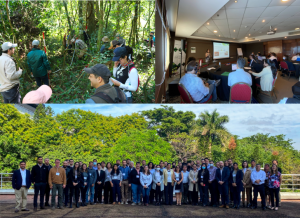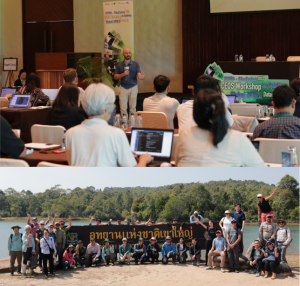SilvaCarbon / CEOS Joint Workshops
Article 14 of the Paris Climate Agreement sets out the concept of the Global Stocktake (GST) as a means to evaluate global progress towards the goals of the Agreement. Earth observations naturally play a key role in this process, and CEOS & CEOS Agencies have been working hard in the years leading up to the first GST, to be held in November 2023, at the 28th Conference of Parties of the United Nation Framework Convention on Climate Change (UNFCCC). This series of articles details the work of CEOS & CEOS Agencies to support the GST process, and includes:
- CEOS Strategy to Support the GST
- CEOS Greenhouse Gas Roadmap
- Global Forest Observations Initiative (GFOI)
- United States Geological Survey (USGS) SilvaCarbon (this article)
- International Methane Emissions Observatory (IMEO)
- Earth Observation Handbook, GST Special Edition
SilvaCarbon is an interagency technical cooperation program of the US Government to enhance the capacity of countries from around the world to measure, monitor, and report on carbon in their forests and other lands. The program involves CEOS Agencies USGS (United States Geological Survey) and NASA (National Aeronautics and Space Administration), and is supported through the Land Surface Imaging Virtual Constellation (LSI-VC) Forests and Biomass Subgroup.
National forest and land use monitoring systems combine different subsystems and data to generate information that meets a variety of country-specific management, policy, and reporting needs. Most systems include remote sensing and forest inventory components, and the integration of these data into GHG inventory. SilvaCarbon assists countries to strengthen technical capacities across each of these components, with emphasis on integrating the components and associated workstreams in holistic national systems that support multiple objectives.

Participants of the Silvacarbon/CEOS Paraguay regional workshop
SilvaCarbon & CEOS have collaborated to provide training for how to use space-based Earth observations to improve forest and landscape monitoring.
The first workshop was held in Paraguay in June 2022, where the focus was on biomass estimation and measurement. In particular, lidar measurements taken by the Global Ecosystem Dynamics Investigation (GEDI) instrument hosted on board the International Space Station were used in the analysis.
The workshop brought together national land monitoring experts and greenhouse gas inventory analysts from Paraguay, Peru, Colombia, Ecuador, Mexico, and Guatemala, with CEOS global land monitoring experts and other international experts from LULUCF (Land Use, Land-Use Change and Forestry) of UNFCCC (United Nations Framework Convention on Climate Change), and IPCC (Intergovernmental Panel on Climate Change). The participants discussed new capabilities for measuring biomass from space and how they can be integrated with plot data to improve estimates of carbon stock per hectare, and national forest and greenhouse gas inventories following IPCC guidance. The workshop also included a field trip to a forest plot to validate a model to map biomass combining GEDI and plot data that has been tested by INFONA (Instituto Forestal Nacional) and USFS.
The results showed that the model underestimated biomass. Still, the level of uncertainty was low enough that this methodology could benefit Paraguay if used in inaccessible areas to augment the National Forest Inventory (NFI).

Participants of the SilvaCarbon/CEOS Thailand regional workshop
A second workshop was held in February – March 2023, in conjunction with 2023 CEOS Chair GISTDA (Geo-Informatics and Space Technology Development Agency), this time focused on both biomass estimation and mangrove mapping. This workshop supported the headline priority of CEOS regarding support to the Global Stocktake of the UNFCCC Paris Agreement and complements the ongoing work of CEOS Agencies, including JAXA’s (Japan Aerospace Exploration Agency) support of the Global Mangrove Watch (GMW) dataset. The workshop connected Southeast Asian national forest inventory agencies with CEOS Agencies to improve the uptake of EO datasets. Country-level calibration, validation, and assessment of global products are critical steps on the pathway to uptake of global EO datasets. The workshop used two forest sites, a montane rain forest and a coastal mangrove forest, to explore the relationships and synergies between ground-based and spaceborne datasets. Additional goals of the workshop included capacity building for conducting mangrove forest inventories and exploring opportunities to improve emission factors using space-based lidar data.
Two additional joint workshops are planned in 2023, both containing mangrove & wetland components. The first will be in September and hosted by Gabon, focusing on supporting countries in the Central African region. The Gabon workshop also will include sessions on how to develop deforestation alert systems to help prevent forest loss before extensive damage occurs. This alert technology likewise relies heavily on satellite-based data for early detection of land-use change. The second workshop will be in November 2023 in Peru, focusing on the Latin American & Caribbean region. SilvaCarbon is also engaging with partners in the Solomon Islands, Vanuatu, Papua New Guinea, and Fiji on mapping land use change. CEOS looks forward to supporting SilvaCarbon on these & other future events.